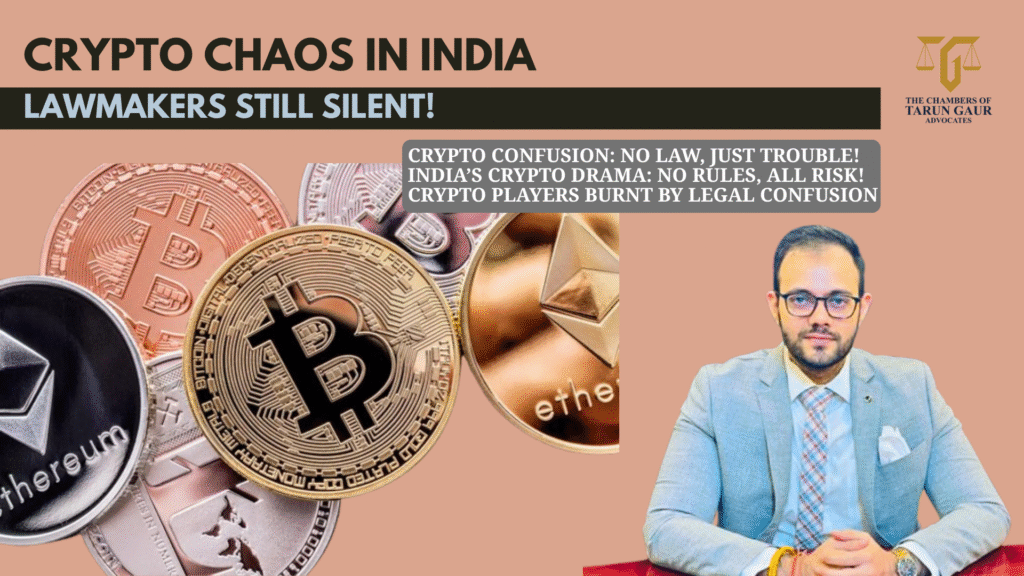By Advocate Tarun Gaur | White-Collar Crime Lawyer | Delhi High Court & Dwarka Court | All India Rank 1 – National Law University, Delhi
The Supreme Court of India, in a pivotal hearing on SLP(Crl) No. 4036/2025 – Shailesh Babulal Bhatt vs. State of Gujarat, recently made a candid and critical observation:
“There exists a grey area in the field of bitcoin/cryptocurrency regulation and the existing laws are completely obsolete.”
As a practicing advocate in the Delhi High Court and Dwarka Courts, specialising in white-collar crime and cyber-financial fraud, I could not agree more. I represent some of the most credible names in India’s cryptocurrency exchange ecosystem, and I see the devastating consequences of this legal vacuum every day. Entrepreneurs with legitimate crypto businesses are being harassed, arrested, and extorted — not because they broke the law, but because the law does not exist.
Crypto Currency Laws in India: The Glaring Void
The current legal framework, or rather the lack thereof, leaves law enforcement agencies fumbling in the dark. In the absence of a dedicated law on cryptocurrency, authorities often invoke outdated provisions from the Indian Penal Code (IPC), Prevention of Money Laundering Act (PMLA), or the Information Technology Act. This approach not only hampers due process but also enables the misuse of the legal system by opportunists masquerading as victims.
Even in the Bhatt case, the Hon’ble Supreme Court shifted focus from the accused’s conduct to the broader issue — the regulatory absence around cryptocurrency. The justices noted that various jurisdictions treat crypto differently, and India’s inertia is becoming indefensible.
From Victim to Accused: The Tragic Inversion
In many cases I’ve handled, clients with transparent blockchain records, KYC-compliant wallets, and legitimate business operations were dragged into criminal proceedings “just to be safe.” Meanwhile, the real perpetrators — those exploiting crypto’s grey status to file false FIRs and demand unlawful settlements — remain untouched.
This inversion of justice is alarming. When extortionists pose as complainants and genuine crypto exchanges are vilified, the legal system becomes a tool of oppression, not protection.
Cryptocurrency Fraud, ED Investigations & The Cry for Bail
The lack of clarity also empowers arbitrary action by enforcement agencies like the ED. Whether it’s an ECIR under the PMLA or a routine cybercrime FIR, the absence of a defined legal threshold means bail in cryptocurrency fraud cases becomes unduly difficult, even when no predicate offence is made out. This legal ambiguity severely affects not only the accused’s liberty but also investor sentiment and business continuity.
A Paradox: Taxing Crypto at 40% Without Regulating It
It’s not that the government is unaware of the role cryptocurrencies play in modern commerce. In fact, the imposition of a 30% capital gains tax, along with 1% TDS and GST overlays — cumulatively pushing tax burdens well over 40% — is proof that the State wants to profit from this emerging economy. But what it refuses to offer in return is legal clarity and protection.
This selective recognition — taxation without regulation — is not only unjust but economically shortsighted. The absence of a regulatory framework enables misuse while stifling legitimate crypto innovation and compliance.
India Can’t Afford to Lose the Crypto Revolution
India has the potential to be a global blockchain hub. Our developers, investors, and entrepreneurs are among the best in the world. But if we continue to criminalise innovation, we risk losing this talent to countries with progressive crypto laws. Regulation must not be feared — it must be embraced to protect investors, promote transparency, and boost economic growth.
The Way Forward: Law, Not Litigation
It is high time the Parliament recognises that crypto regulation is a legislative necessity. The judiciary can only go so far. The government must introduce a clear, comprehensive, and enforceable law on crypto currencies, crypto mining, and digital asset exchanges. Only then can enforcement agencies act with accountability, and only then will honest business owners be free from undue persecution.
About the Author
Advocate Tarun Gaur is one of India’s leading white-collar crime lawyers with special expertise in cryptocurrency law. Practicing at the Delhi High Court and Dwarka Court, he represents several crypto exchanges and blockchain startups across India. He is also among the very few cryptocurrency lawyers in India today and is an All India Rank 1 holder from India’s premier National Law School.
If you’re looking for expert legal advice on cryptocurrency fraud, ED investigations, bail in crypto cases, money laundering under PMLA, or crypto compliance, connect with Advocate Tarun Gaur today.

